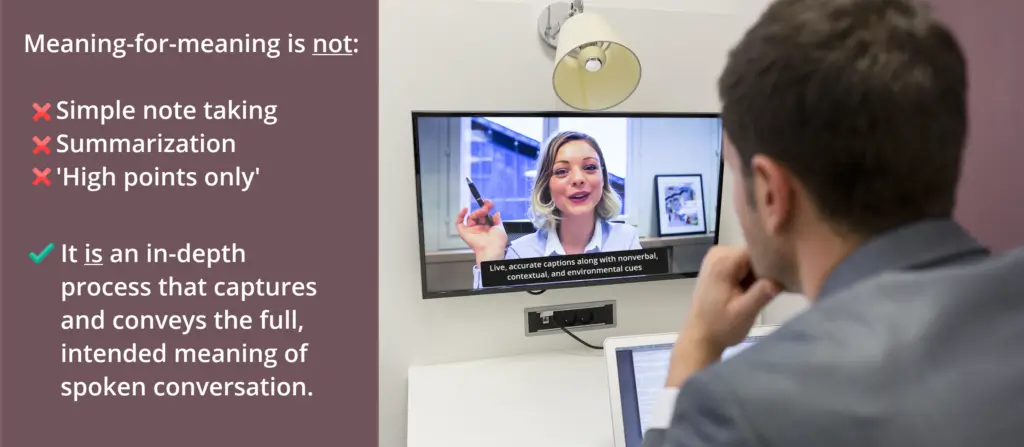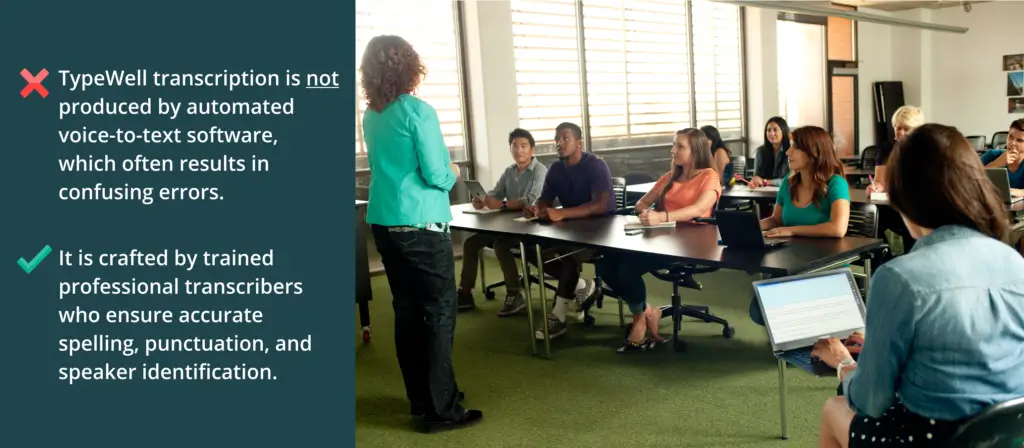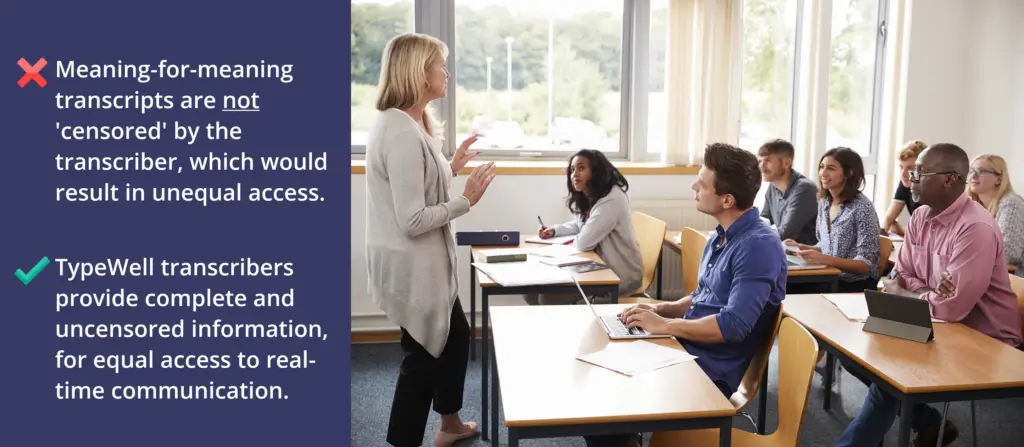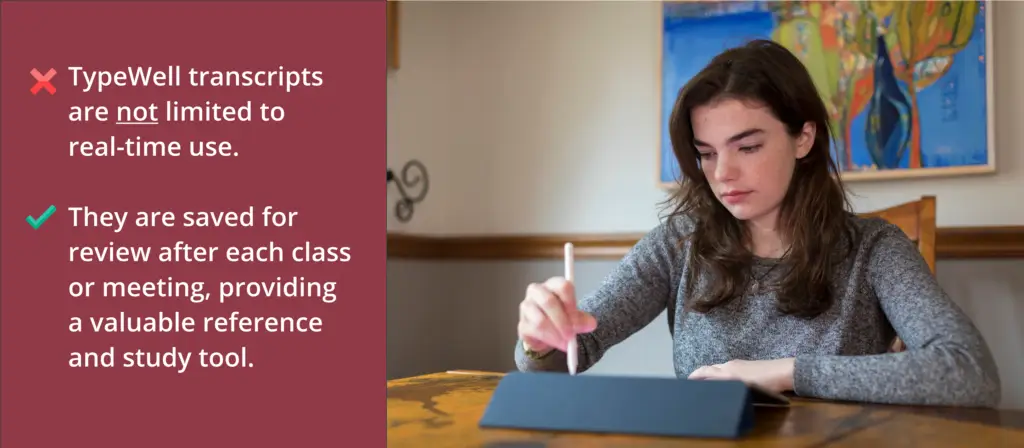Professional Transcription Services and Training for Communication Access
We train professional transcribers to provide real-time, meaning-for-meaning transcripts that improve accessibility in classrooms, meetings, and events—offering a clear alternative to traditional CART services.
Auto-captions can be disorganized and exhausting to read. A TypeWell transcriber goes beyond traditional real-time transcription by distilling spoken language to its core meaning.
Using fewer words, while still maintaining clarity and depth, TypeWell offers accurate, immediately accessible communication.
Whether you’re managing attention issues, seeking accessibility, or simply prioritizing effective communication, TypeWell is your partner in ensuring effective and concise communication.
How We Help: Training, Connecting, and Supporting Transcribers

Highly-Qualified Transcribers
Gain immediate access to our pool of expertly trained, highly-skilled TypeWell transcribers who are ready to accept remote assignments right away.
We can also guide you through the process of choosing and training your own transcribers, or partnering with other transcription agencies.
Professional Training
We provide comprehensive training and ongoing support to aspiring TypeWell transcribers throughout their professional journey.
From initial skills development to continuing education in specialized areas, we are committed to supporting your growth and success.

Placement & Support
Are you a trained TypeWell transcriber looking to apply your skills in new and diverse environments?
Or perhaps you’re an employer in search of qualified TypeWell transcribers, ready to work remotely or join your team on-site. Let us help you find the perfect match!
How It Works: Delivering Live Transcription Services for Accessibility
A trained TypeWell transcriber synthesizes the essence of the discussion and captures it using advanced abbreviation software.
The recipient simultaneously sees the transcript using a standard Web browser on a mobile device, such as a laptop, tablet, or smartphone.

Live captions can also be integrated into Zoom and other video conferencing platforms.
Meaning-for-Meaning Transcription: A Smarter Approach to Communication Access
Originally designed for educational environments, TypeWell’s distinct approach aims for quick comprehension—setting a new standard in communication access where speed and understanding are paramount.
Meaning-for-meaning transcription captures the speaker’s intent without unnecessary repetition, making it easier to follow in real time.
It’s not censorship, oversimplification, or summarizing. It’s a skilled, intentional process that requires careful judgment to preserve meaning while reducing cognitive load.




How Meaning-for-Meaning Transcription Supports Accessibility:
- Prioritizes clarity and comprehension for real-time readers
- Reduces cognitive load by condensing spoken language
- Makes fast-paced discussions easier to follow
- Helps users stay engaged without needing to read every word
How It Differs from Verbatim Transcription:
- Focuses on intent rather than word-for-word accuracy
- Omits filler words and false starts for smoother reading
- Requires human judgment, not automated speech recognition
- Designed to enhance understanding—not to transcribe every utterance
See the difference this makes:


Verbatim

Meaning-for-Meaning

Verbatim

Meaning-for-Meaning

Want to see it in action?
Request a free demo!
We provide product tours and up to 2 free hours of trial services
Disability Service Coordinators:

Build an enduring collaboration with an expert support team that understands your organization's needs
Whether you work in Accessibility Services, Human Resources, or another coordinating role, our solution-oriented team can help make your job easier. TypeWell is a cost-effective and advanced speech-to-text accommodation that’s easy to implement and maintain at your school, business, or organization.
To provide access to substantive content in classes or meetings, you need a skilled speech-to-text transcriber — not just a note taker. We offer the most effective training in our industry. TypeWell transcribers use advanced software that’s continually modernized with new features and dictionary updates.
Recommended for Service Coordinators:
Services can typically be implemented pretty quickly, depending on availability. For remote services, it may be possible to secure services within a matter of hours. For on-site services, if there is a transcriber in your area, it may take several days to coordinate logistics.
An on-site TypeWell transcriber uses a laptop on a steno table and sits in an area of the room that ensures optimal ability to hear both lecturers and participants while also viewing any overhead screens or visual materials.
As they transcribe, the typed words become visible in the recipient’s web browser within seconds, via our live streaming text platform.
A remote (off-site) transcriber listens to the lecture or discussion remotely via Zoom, Skype, or another audio platform. As they transcribe, the typed words become visible in the recipient’s web browser within seconds, via our live streaming text platform.
TypeWell transcribers are predominantly based in the United States or Canada (except for the lucky few who live in exotic places) and are native English speakers.
The upfront and ongoing costs of TypeWell services can vary, depending on the type of services you need, how quickly you need them, and whether you want to hire and train your own employees or contract with a third-party provider.
Please visit our Pricing Page to learn more.
Recruiting your own candidate to complete our transcriber training course usually takes 6-9 months (the training itself only takes 2-3 months). This approach allows you to build your own skilled pool of on-site providers!
- Develop a job description and job posting that directs all applicants to complete our screening tests first.
- Of the candidates who quality for our course, interview and select one or more to hire and sponsor.
- Pay TypeWell upfront to enroll each candidates in the Basic Skills Course.
- Support and monitor your candidates throughout the training, as our teaching team will regularly update you on their progress.
- Once they complete training, identify skill-appropriate job assignments for your new transcribers to continue honing their skills.
- Provide mentoring opportunities and feedback for your new transcribers, especially during their first year.
- Our teaching team supports each candidate by providing personalized guidance and feedback throughout the Basic Skills Course.
- We provide one-on-one mentoring sessions during their first few months, to help them get a strong start.
- We will communicate regularly with you and your new transcribers to ensure that everything works smoothly.
- TypeWell also offers a range of supplemental continuing education courses.
We would be happy to talk with you! Schedule a call with our director, Kate, or contact us for a quick email response.
Check out our knowledgebase for more answers, such as:
- How It Works
- Administrative Questions
- General Questions
- Who can benefit from TypeWell transcription services?
- How can we set up a transcription program at my institution?
- What happens to the transcript after class?
- How much do transcribers get paid?
Students, Parents, and Advocates:

Real-time access to communication, with complete transcripts for reference afterward.
TypeWell helps people participate effectively in work, classes, meetings, and other group gatherings—including social events and religious services—by giving them access to what others are saying, without being tethered to a note taker or interpreter.
Students who may have previously relied on sign language or lip reading tell us TypeWell is liberating and life-changing because they do not have to keep their eyes fixed on the interpreter or speaker, and they can sit anywhere they choose.
Others say that they feel more comfortable and confident participating in the discussion because they know that their question hasn’t already been asked and answered. Or, if they look away momentarily or rest their eyes, they know they can quickly catch up.
I Want to Know:
The majority of individuals utilizing TypeWell services are college students who are deaf or hard-of-hearing. TypeWell also caters to younger students (pre-college) and individuals in corporate environments.
Additionally, those with typical hearing abilities but who have Autistic Spectrum Disorder, ADHD, auditory processing disorders, or other learning challenges frequently find TypeWell services beneficial.
Students/readers can access the live transcript in two ways:
- They will receive a web link that provides access to the transcript as it is being typed in real-time by the transcriber. The transcript updates live as the transcriber types.
- If the session is being held over Zoom, students/readers have the option to enable Zoom’s live captions feature to view the transcript directly within the Zoom window.
The transcriber may be present physically in the same room as the lecture/meeting, or they may be logged in remotely via Zoom, Skype or another virtual service to provide the transcription.
TypeWell proudly offers services to K-12 students.
However, real-time captions may not benefit all K-12 students. Several factors influence a child’s readiness for TypeWell’s transcription services.
To gain an in-depth understanding of this topic, we recommend reading the blog post ‘Beyond Reading Levels: Understanding the Suitability of Transcription Services for Deaf and Hard-of-Hearing Students.
Speech-to-text services like TypeWell are usually coordinated through the accessibility office at schools (or the HR department at companies). The process typically involves:
- Submitting a request for accommodations;
- Providing documentation of the disability from a healthcare provider;
- The coordinator determining if TypeWell is a reasonable accommodation;
- If approved, the institution schedules TypeWell’s qualified transcribers to provide services on-site or remotely.
While AI-powered speech recognition has made impressive advances, TypeWell’s human transcribers provide a level of accuracy and naturalistic translation that goes well beyond current ASR capabilities. TypeWell transcribers are highly trained professionals adept at understanding contexts, conveying intended meanings, and smoothly transcribing complex ideas – not just capturing words verbatim.
They can also seamlessly identify and designate different speakers, describe environmental sounds, and provide clarifications in real-time. This human transcription approach ensures all nuances, idioms, jokes, and other linguistic subtleties are accurately conveyed in the transcript, making it significantly more meaningful and useful than typical AI-generated captioning.
Deaf and hard of hearing students, especially in mainstream classes, can miss a lot of information communicated verbally. TypeWell transcribers provide a live transcript of everything said by the teacher and other students, allowing the deaf/hard of hearing student to read the discussion in real-time on a device.
Having spoken information transcribed in real-time can allow some individuals to better focus on the content being presented. A written transcript can reinforce auditory input and reduce the cognitive load of trying to listen and process verbal information at the same time.
This support can lead to increased participation in discussions, as the individual reading the transcript can keep pace with conversation in real-time. The flexibility of this multi-modal approach accommodates diverse environments and preferences to make meetings and conversations more comprehensible.
While hearing aids and FM systems are designed to amplify sound for those with hearing loss, they might not always ensure clarity of speech in noisy environments, during conversations with multiple speakers, or when the speaker is at a distance. TypeWell services offer a complementary solution by providing real-time, meaning-for-meaning text transcription, which is invaluable in situations where background noise or poor acoustics can hinder the effectiveness of hearing aids or FM systems. More than just transcribing words, TypeWell captures the essence of communication, enabling a deeper understanding of complex discussions, nuances, and context essential for effective communication and learning.
The cost of TypeWell transcription services can vary depending on several factors. TypeWell service providers do not directly bill individual students or families. Instead, they contract with schools, universities, employers, and other institutions to provide services. These organizations typically cover the costs through their disability services offices, HR departments, or accommodation budgets.
Pricing is structured based on the specifics of each contract, which may account for the number of hours needed, technical requirements like remote or on-site provision, and any additional services requested. The easiest way to get a cost estimate is to have the office coordinating accommodations at your school or workplace contact TypeWell directly.
We would be happy to talk with you! Schedule a call with our director, Kate, or contact us for a quick email response.
Check out our knowledgebase for more answers, such as:
Why is communication access important?
Equal Access
Everyone in a class or meeting has the right to participate as the conversation unfolds.
Real-time transcripts enable live, two-way conversation between the recipient and everyone else—unlike “notes” which are typically provided after-the-fact.


Compliance
TypeWell can help your organization comply with accessibility laws. In the 2004 revision of the Individuals with Disabilities Education Act (IDEA), Congress specifically named TypeWell as a transcription service that meets the definition of interpreting services and should be considered as an effective tool to meet the communication access needs of students with disabilities [Section 300.34(c)(4)].
Language Fluency
Many people who are deaf/hard-of-hearing are not fluent in sign language. In fact, many use English as their primary language. TypeWell services can benefit veterans, seniors, people with auditory processing or language processing disorders, those who are in the process of learning English, and others who experience hearing loss later in life.

Why is communication access important?
Equal Access
Everyone in a class or meeting has the right to participate as the conversation unfolds.
Real-time transcripts enable live, two-way conversation between the recipient and everyone else—unlike “notes” which are typically provided after-the-fact.

Compliance
TypeWell can help your organization comply with accessibility laws. In the 2004 revision of the Individuals with Disabilities Education Act (IDEA), Congress specifically named TypeWell as a transcription service that meets the definition of interpreting services and should be considered as an effective tool to meet the communication access needs of students with disabilities [Section 300.34(c)(4)].

Language Fluency
Many people who are deaf/hard-of-hearing are not fluent in sign language. In fact, many use English as their primary language. TypeWell services can benefit veterans, seniors, people with auditory processing or language processing disorders, those who are in the process of learning English, and others who experience hearing loss later in life.





Co-founder of the Association of Late-Deafened Adults




